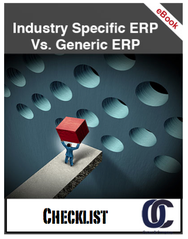We talk A LOT about enterprise resource planning (ERP) systems on our blog, and for good reason: they are the best bet for your business. If you follow along with us, you've read about how ERP systems work, and what kind of mistakes you should avoid if you implement one, and what stages you'll go through to do so. Et cetera.
But we would be remiss if we didn't talk about the other choice of software that you have: industry specific software.
So when it comes to choosing a software system to run business, choices have, in recent years, essentially narrowed to two types:
- industry specific software
- enterprise resource planning software

Today we're going to start with a basic outline – what’s good about industry specific software and what's bad about industry specific software. What's good about enterprise resource planning software and what's bad about enterprise resource planning software. We'll explain why ERP systems are better, but let's start with the advantages and disadvantages first, shall we?
Industry specific software is, as it sounds, software that is used for a specific industry. For example, there is EMR – electronic medical records – software for healthcare, CAD – computer aided design –for the construction and architecture fields, and POS – point of sale – software for retail establishments. Banking is another industry that often has its own software.
Enterprise resource planning (ERP) software, on the other hand, can be used with almost any industry – the software addresses accounting, inventory control, manufacturing, order entry, purchase orders, and a host of other business issues. It is especially useful because it integrates everything into a central location, which improves internal processes and promotes efficiency.
As with everything, each of these choices has advantages.
Industry specific software:
- has great strengths in the areas that are unique to its industry
- does an excellent job at the tasks it is designed to handle
- is generally less expensive and less time consuming than implementing ERP software
ERP software:
- stores all of a company’s data in a single database that is accessible from anywhere by anyone at any time
- easily tracks years of data
- eliminates the need for each department to have its own software
- accumulates, organizes, and analyzes data from multiple sources – from each department, for example – which allows for a more holistic view of a company’s performance
- updates in real time, making its data more accurate
- streamlines workflow
- runs a wide array of tasks concurrently
They also have disadvantages.
Industry specific software:
- doesn’t “talk to” or integrate with other types of software, which often means that some data must be entered twice
- isn’t designed to manage an entire business
- isn’t consistent across business site locations
ERP software:
- costs a lot
- Implementing ERP software at a mid-sized company can cost hundreds of thousands of dollars; implementation at a large corporation can cost millions of dollars. The price fluctuates with more than just business size as well – the more employees that will be using the system, the more expensive it is.
- requires a lot of time and energy
- Implementing an ERP system involves choosing the right vendor for your company, finding a consultant, building a team, designing the system to fit your needs, compiling data, testing data, running a mock go-live, and then actually going live.
- In addition, training for employees is an absolute must, and the training cannot be superficial or generic – it must be targeted and comprehensive.
Industry specific software is so specialized that enterprise resource planning software has been called “generic.” This, however, is a misnomer, because while it is true that ERP software is useable in multiple industries, it is untrue to say that the software is not specific. Since it is impossible to have a single piece of software that could cover all the functions of every company ever, ERP systems are designed to be customizable. Businesses have a slew of add-ons to choose from and even have the option of altering the software’s code – so after an implementation, the ERP system is specific to a company and their industry.
Come back soon to find out more reasons that enterprise resource planning software is better than industry specific software.



